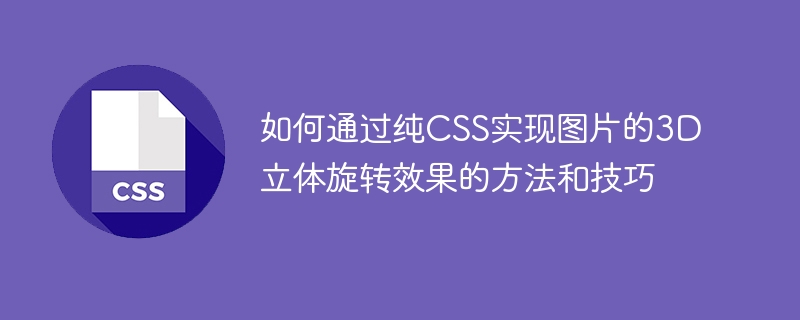Home >Web Front-end >CSS Tutorial >Methods and techniques on how to achieve the 3D rotation effect of images through pure CSS
Methods and techniques on how to achieve the 3D rotation effect of images through pure CSS
- 王林Original
- 2023-10-24 09:54:341727browse

Methods and techniques on how to achieve the 3D rotation effect of images through pure CSS require specific code examples
With the development of Web technology, we can achieve it through CSS Various stunning effects, including 3D rotation of pictures. This article will introduce how to achieve such an effect through pure CSS, and provide specific code examples to help readers easily master the technique.
To achieve the 3D rotation effect of images, we need to use the transform and transition properties of CSS, as well as some basic CSS animation knowledge. The following are specific steps and code examples:
- First, we need to define an HTML container to display images. You can use a div element and give it an appropriate class or id attribute, such as "image-container".
- In the CSS file, add some basic styles to the container, such as setting width, height, border, etc.
.image-container {
width: 300px;
height: 300px;
border: 1px solid #ccc;
}- Next, we need to add an img element to the container to display the image. You can use absolute or relative positioning to make the image cover the entire container.
.image-container img {
position: absolute;
width: 100%;
height: 100%;
object-fit: cover; /* 可选:根据需要调整图片的适应方式 */
}- Now, we want to achieve the rotation effect. First, we need to add a pseudo-element to the container as a reference point for rotation. You can use ::before or ::after to set its width and height to 100%.
.image-container::before {
content: '';
position: absolute;
top: 0;
left: 0;
width: 100%;
height: 100%;
}- Then, we need to perform some transformation operations on the container, including rotation and perspective effects. This can be done using the transform attribute.
.image-container {
transform-style: preserve-3d;
perspective: 1000px; /* 可以根据需要调整透视效果的强度 */
transform: rotateY(0deg);
transition: transform 0.5s; /* 可以根据需要调整过渡的时间和效果 */
}- Finally, we need to add some interactive effects to the container to achieve rotation animation. You can use CSS's :hover pseudo-class selector to add a rotation angle when the mouse is hovering.
.image-container:hover {
transform: rotateY(180deg);
}Through the above steps, we have achieved the 3D rotation effect of the picture. When the mouse is hovered over the container, the image will rotate 180 degrees from the center point of the container.
I hope the above methods and code examples will be helpful to readers in achieving the 3D rotation effect of pictures. By flexibly using CSS properties and knowledge, we can create more stunning web effects. come on!
The above is the detailed content of Methods and techniques on how to achieve the 3D rotation effect of images through pure CSS. For more information, please follow other related articles on the PHP Chinese website!

